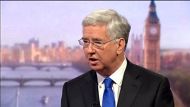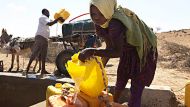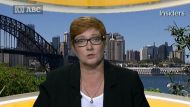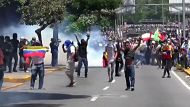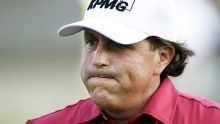With one massive question of war demanding an answer, Malcolm Turnbull found himself reflecting on another moment in time, three quarters of a century ago, when the response of a relative few determined the fate of two nations.
That question is whether the response to Donald Trump's decision to launch missile strikes on Syria will escalate what Mr Turnbull aptly calls "this shocking war", or be a catalyst for talks toward a political solution and peace.
More World News Videos
PM has grave doubts about Assad's future role
Malcolm Turnbull has declared that dictator ÂBashar al-Assad has disqualified himself from any role in a political settlement in Syria and should be placed on trial for his "horrendous" war crimes. Vision courtesy ABC News 24.
The simple answer, relayed to our Prime Minister during a pilgrimage to the Kokoda Track on Saturday, was that it was too early to say.
Before he addressed the question, a sombre Mr Turnbull spoke of "the hinge of fate" that saw Australian soldiers with little training rise to the challenge in 1942 in the most horrific conditions and keep Australia free.

"Had their courage not been enough, had their mateship not been resolute enough, the Japanese would have taken Port Moresby and Australia would have been under the most direct and imminent threat," he remarked at the Bomana War Cemetery on the outskirts of Port Moresby.
"Without their sacrifice we would not be the free nation we are today, nor would PNG be the free nation it is today. This shared sacrifice, this shared heroism, this endurance, this mateship, this is what kept us free."
Those four words -¬†courage, endurance, mateship and sacrifice - are, of course, inscribed in the granite pillars of the Isurava‚Äč Memorial that was built at the site of some of the most intense fighting of the Kokoda campaign.
Mr Turnbull flew by helicopter to the site and was greeted by children who had walked for an hour from their village to welcome him by sprinkling flowers on the track, waving flags and planting a lei around his neck.

Then he flew to Bomana where more than 3,350 Australians are buried, where Mr Turnbull paused the the gave of Bruce Kingsbury, who died at Isurava, having taken "a Bren gun, heedless of the risk to his own life, to clear a way for his mates, clear the Japanese from their path".
"How does this experience make you feel about your responsibility as Prime Minister to those serving members?" he was asked.
There was no greater responsibility for a Prime Minister, for a Government, than sending young men and women into harm's way, he replied. "That is the heaviest responsibility of my role as Prime Minister and of every Government from the beginning of our nation's history."
Before addressing reporters, Mr Turnbull took calls from Defence Minister Marise Payne and the head of the Defence Force, Air Chief Marshall Mark Binskin, on the response to air strikes.
He then reaffirmed Australia's support for President Trump's "swift and just" response to the Assad regime's use of chemical weapons, insisted the Syrian dictator had disqualified himself from being part of the solution and challenged Russia to "bring this shocking conflict to an end".
The Russian response did not take long, and was to increase the temperature, not lower it as Mr Turnbull had hoped, confirming it is utterly premature to suggest which way this "hinge of fate" will ultimately turn.


